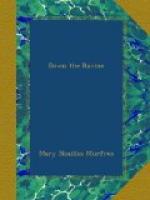“Look-a-hyar, bub,” said Jubal Perkins, with both hands in his pockets and glaring down solemnly at Rufe; “ef ever I ketches ye goin’ of yerrands no better’n that ag’in, I’m a-goin’ ter—tan that thar hide o’ yourn.”
Rufe gazed up deprecatingly, his eyes widening at the prospect. Byers broke into a horse laugh.
“We’ve been wantin’ some leetle varmints fur tanning ennyhow,” he said. “Ye’ll feel mighty queer when ye stand out thar on the spent tan, with jes’ yer meat on yer bones, an ‘look up an’ see yer skin a-hangin’ alongside o’ the t’other calves, an’ sech—that ye will!”
“An’ all the mounting folks will be remarkin’ on it, too,” said Perkins. Which no doubt they would have done with a lively interest.
“I reckon,” said Byers, looking speculatively at Rufe, “ez’t would take a right smart time fur ye ter git tough enough ter go ’bout in respect’ble society ag’in. ‘T would hurt ye mightily, I’m thinkin’. Ef I war you-uns, I’d be powerful partic’lar ter keep inside o’ sech an accommodatin’-lookin’ little hide ez yourn be fur tanning.”
Rufe’s countenance was distorted. He seemed about to tune up and whimper. “An’ ef I war you-uns, Andy Byers, I’d find su’thin’ better ter do’n ter bait an’ badger a critter the size o’ Rufe!” exclaimed Birt angrily.
“That thar boy’s ’bout right, too!” said the man who had hitherto been standing silent in the door.
“Waal, leave Rufe be, Jubal!” said Byers, laughing. “Ye started the fun.”
“Leave him be, yerself,” retorted the tanner.
When Birt mounted the mule, and rode out of the yard, he glanced back and saw that Rufe had approached the shed; judging by his gestures, he was asking a variety of questions touching the art of tanning, to which Byers amicably responded.
The mists were shifting as Birt went on and on. He heard the acorns dropping from the chestnut-oaks—sign that the wind was awake in the woods. Like a glittering, polished blade, at last a slanting sunbeam fell. It split the gloom, and a radiant afternoon seemed to emerge. The moist leaves shone; far down the aisles of the woods the fugitive mists, in elusive dryadic suggestions, chased each other into the distance. Although the song-birds were all silent, there was a chirping somewhere—cheerful sound! He had almost reached his destination when a sudden rustling in the undergrowth by the roadside caused him to turn and glance back.
Two or three shoats lifted their heads and were gazing at him with surprise, and a certain disfavor, as if they did not quite like his looks. A bevy of barefooted, tow-headed children were making mud pies in a marshy dip close by. An ancient hound, that had renounced the chase and assumed in his old age the office of tutor, seemed to preside with dignity and judgment. He, too, had descried the approach of the stranger. He growled, but made no other demonstration.




